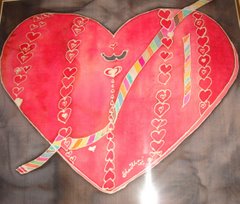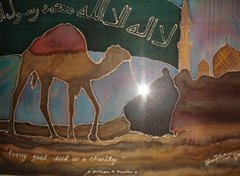CD3
By: Imam Anwar Awlaki
The Background of Arabia
Objective: To know the environment in which the Prophet (SAW) lived in.
The Arabs started with Tawheed due to the da’wah of Ismail. There were three religions at the time of the Prophet (saw) in Arabia, i.e. Idol-Worshipping, Christianity, and Judaism. How did these three religions come into existence?
Idol-Worshipping
· ‘Amr Al-Khuza’I, the leader of Khuzaa, was generous, strong, and respected by his people. His words were taken as law. He traveled to Syria (Ash-Sham, center is Jerusalem) and finds idols, he asked the people about them and they told him they are intermediates to God when we ask Him. They appeal to God in their behalf. ‘Amr then agreed that this is exactly what they also need in Arabia. He asked for an idol to take home, and he was given Hubal.
· He then took it to Makkah and established it near Ka’bah and told his people that it would intercede on their behalf to Allah. Makkah, being the spiritual center of Arabia, became the platform from which idol-worshipping was exposed to people. It then became common and spread all over due to the position of Makkah and of ‘Amr.
· It then became a business, wherein people in Makkah will make idols that travelers can carry with them home (‘portable idols’). It evolved to be made in different shapes and sizes, for different purposes. ‘Umar once related how, during the time of ignorance, he was traveling and forgot to bring his ‘god’ with him. And so he made one out of dates and when he got hungry, he ate it. Knowing the vital role that ‘Umar (r.a.) played later on in Islam, it just goes to show the miracle of Islam, having turned people from nothingness to great figures throughout history.
· Al-Ka’bah is now surrounded by 365 idols, and polytheism became so widespread all over Arabia. The Prophet (saw) said: “I saw Al-Khuza’I trailing his intestines in Hellfire because he was the first person to change the religion of the Arabs.”
Judaism
· The King of Yemen, Kabban As’ad, was traveling to do business in Ash-Sham and passed by Medina. He left his son in Medina for him to do business there, but the people of Medina killed his son. When he came back and learned about it, he decided to destroy Medina and attacked it. His armies were large in number and would have been enough to destroy it.
· The Jews then have settled in Medina due to their belief, as mentioned in their scriptures, that their Prophet will immigrate to a land which resembled Medina, since they saw all the signs point to Medina being the correct place. There were three tribes: Banu Qaynuqa’, Banu Nadeer, and Banu Quraydah. They are known to be Ethnic Jews from Khaybar and Medina.
· Then two rabbis came out and told As’ad that this land is protected by God and that if he tries to destroy it Allah will destroy him. They convinced As’ad and made him withdraw from attacking, and even embraced Judaism and invited these two rabbis to Yemen and they agreed.
· On his was back, Banu Hawazim were having problems with Quraysh and were starting a fitnah between As’ad and Makkah. The rabbis again told him that this land (Makkah) is also protected by Allah and that he shouldn’t attack it, instead, he should enter it and make tawaf. He did so, and he became the first person to clothe Al-Ka’bah, and he used to clothe it once a year. They used to clothe it by adding one over the other each year, since they consider the clothing of the Ka’bah to be sacred and couldn’t remove it, until it became so heavy that they decided to take it off and keep just one clothing at a time.
· As’ad and the rabbis then proceeded to Yemen and he gave them freedom to preach to the Yemeni tribes and many of them embraced the Jewish faith. They are known to be Jews by Conversion.
Christianity
· When ‘Eesa (as) was sent, his followers dispersed throughout the land and very early on, it was already divided into many sects. These sects then became disbelievers and misguided, however, there were some believers here and there who were able to preserve the true message of ‘Eesa (Tawhid). One of them reached Yemen and started preaching in the area of Najran and the religion was secretly and slowly spreading.
· By this time, As’ad was already dead and his son, Dhu Nawwas, took over his reign. News of this new religion reached him and he banned it and he persecuted the followers. In Sahih Muslim, where it relates the story about the ‘boy and the king’, many scholars relate this incident to Dhu Nawwas as the king. Also in Surah Al-Buruj, Allah described their sacrifice as victory, and it is the fact that they were able to hold on to Islam until their last moment, and were able to attain Paradise. That is the true essence of winning, although they lost a temporary battle in dunya.
· From the ‘People of the Trench’, there was one who survived, and he traveled to the Roman Empire, since they were also Christians although from a different sect. He sought help from the emperor, and the emperor sent a message to An-Najashi, and he sent an army led by a general named Ariat. Ariat invaded Yemen, and defeated Dhu Nawwas, who committed suicide eventually. They said that he was on his horse and just jumped into the Red Sea and killed himself. Now the Abyssinians ruled over parts of Yemen as a revenge for those Christians who were killed. Ariat ruled over and was strict, and one of his generals staged a coup against him. The Abyssinians were then divided between followers of Ariat, and that of Abraha and they were fighting.
· Ariat told Abraha to have a one-on-one fight, and Abraha agreed. But he made a secret agreement with his security guards that if they see him losing, they should come and help him, otherwise to leave him alone. Ariat was tall and thin, while Abraha was short and chubby so Ariat was able to strike him on his head and cut off his nose. When that happened, the bodyguards jumped in and killed Ariat.
· Abraha now took over and ruled over Yemen. He wanted to change the religion of the Arabs and force Christianity upon them. So knowing their attachment to the Ka’bah, he built a huge cathedral (Al-Qullays) in San’aa to compete with Al-Ka’bah. One man didn’t like this idea and went into Al-Qullays and desecrated it. Abraha became furious about this and decided to destroy Ka’bah.
· There were some resistance on the way, like the general Nufayl, but they were all defeated. Nufayl was then captured as a prisoner of war. They went on to Ta’if and they assisted Abraha, and one of them offered to be his guide to Ka’bah, Abu Raghal. Abraha made it to the outskirts of Makkah and took possessions of the camels that were grazing there. 200 of these camels belonged to Abdul-Muttalib. So Abdul-Muttalib came to Abraha and met with him. Nufayl, a friend of Abdul-Muttalib, became friends with Nuwais, an important member of the army and a pilot of the elephant, and arranged the meeting through Nuwais.
· Abdul-Muttalib was an impressionable man and Abraha looked at him with esteem, although they haven’t spoken to each other yet. He came down from the throne and sat with him on the floor. Abdul-Muttalib then asked that his camels be returned to him. Abraha then said that he has lost respect for Abdul-Muttalib since he was coming to destroy Ka’bah and he was asking about his camels. Abdul-Muttalib said that he was the owner of the camels, and that he was responsible for them. But the Ka’bah belongs to Allah and He will protect it. Abraha then gave him back his camels.
· When he went back to Makkah, Abdul-Muttalib told the people not to fight and that they should withdraw to the mountains. When Abraha finally came with his elephants, the elephants would not attack it. It is said that Nufayl whispered to the ear of the elephant that this is the house of Allah and that it should not be attacked. The elephant refused to move even though they poked and speared it, so they decided to leave it behind.
· Anything can be the army of Allah, like water or wind, as mentioned in the ayah “And none knows the soldiers of your Lord except He.” So He sent on the army of Abraha birds carrying missiles and destroyed them all. And this event was recorded in Surah Al-Fil.
· These were the events that happened that led up to the year that the Prophet (saw) was born, in the same year of the Elephant.
skip to main |
skip to sidebar


May Allah reward Sheikh Adil Hameed As-Sabri,Sheikh Anwar Al-Awlaki and Sister Hamida Khan for their contribution to Islam in general and their inspirational influence to me in specific, and all others for their works that I will be citing.
Qur'an & Music can't stay in one place(heart)together,one Must go!

Islam???
VIDEOS! Sheikh Khamees Al-Zahrani
VISIT THIS! for THE RIGHT ANSWER
more videos!!!
Blog Archive
- Feb 08 (1)
- Feb 09 (9)
- Feb 10 (3)
- Feb 11 (3)
- Feb 12 (2)
- Feb 13 (3)
- Feb 14 (5)
- Feb 15 (4)
- Feb 16 (9)
- Feb 17 (8)
- Feb 18 (11)
- Feb 19 (9)
- Feb 20 (1)
- Feb 25 (13)
- Feb 26 (7)
- Feb 28 (5)
- Mar 03 (7)
- Mar 06 (6)
- Mar 07 (3)
- Mar 10 (4)
- Mar 14 (19)
- Mar 15 (4)
- Mar 16 (10)
- Mar 20 (9)
- Mar 22 (7)
- Mar 27 (3)
- Mar 29 (7)
- Apr 01 (6)
MUST VISIT!!!
Imam Anwar Al- Awlaki
FEEL FREE TO SIGN &
The Torch Of Emaan
- INVOCATIONS (51)
- 40 HADITH (42)
- The Mothers of the Believers (25)
- Fundamentals of Tawheed (23)
- PURIFICATION OF THE SOUL (10)
- The Life of Muhammad: Makkah Period (7)
- SINCERITY (5)
- Jewels in the Qur'an (4)
- The Names and Titles of the Prophet Muhammad (3)
- The Wisdom Behind Prophet's (saw) Marriages (3)
- Something to Ponder (2)
- Asma Ul Husna (Names of Allah) (1)
- LIST OF QUALITIES THAT LEAD TO COMPLETENESS OF FAITH (1)
Our beloved Sheikh Adil Hameed As-Sabri
About Me
- sumpingMoro
- Assalaamu-Alaikom…A Blog is sometimes referred to online diary however instead of hosting personal entries about myself I will be writing about how we develop a personal enclose relationship with Allah (swt) our Creator and His last Messenger the Prophet Muhammad (saw). I will also be posting entries about personal development in terms of Soul Purification and Sweetness of Faith. Wa Jazak Allahu Khairan

All of the right things that I have said are from Allah (swt) and all of the wrong things I have said are myself and whispering of shaytaan.-sumpingmoro
